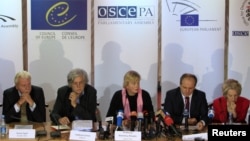KYIV —
Ukrainian President Viktor Yanukovych appears poised to regain his parliamentary majority after Sunday’s elections.
With about 70 percent of the ballots counted, the president’s Regions Party and his Communist allies have received about 48 percent of the vote. With the addition of deputies elected as independents, analysts say the president seems guaranteed to be able to forge a majority in Parliament.
Ukraine's parliamentary elections on Sunday drew attention from afar - the country rests between Europe and Russia - and were viewed by many as a mid-term litmus for President Viktor Yanukovych. A record 3,500 foreign observers came here to monitor the vote.
'A step backwards'
But European observers harshly criticized the campaign, which came halfway through Yanukovych’s five-year term.
Walburga Habsburg Douglas, observation mission leader for Organization for Security and Cooperation in Europe (OSCE), said the vote was a backward step for the nation of 46-million people.
“Considering the abuse of power and the excessive role of money in this election, democratic progress appears to have reversed in Ukraine," Douglas told a packed press conference. "The October 28 parliamentary election was characterized by a lack of level playing field, lack of transparency, and a lack of balanced media coverage.”
Even with key party leader Yulia Tymoshenko in jail, European observers noted that her pro-Western Fatherland Party was receiving 23 percent of the vote. The other two opposition parties, UDAR led by a heavyweight boxing champion, was getting 13 percent, while Svoboda, a nationalist party, was drawing nine percent.
Two Sunday night exit polls gave the three opposition parties higher percentages, and the two governing parties lower percentages. The Central Election Commission has been criticized for refusing to publish detailed voting returns.
Audrey Glover, OSCE's long-term observation leader, criticized the vote-counting and the campaign.
"The competitive nature of the campaign was negatively affected by intimidation, violence and vote buying," she said.
Voter turnout was 58 percent, about six percent lower than the last parliamentary elections five years ago. Almost half of voters surveyed earlier this month said they feared fraud would be big enough to affect the outcome.
"Most worrying is the fact that the campaign was marred by abuse of administrative resources – blurring distinction between state and ruling party," Glover added.
Reflecting voter alienation, almost one-quarter of voters cast ballots for a radical party – for communists on the left or for the nationalist Svoboda, or Freedom Party, on the right.
Criticism dismissed
Ukrainian Prime Minister Mykola Azarov dismissed the criticism.
"We already know statements from the whole range of election observation missions, every one of them is positive," he said. "And we hope that, as a whole, all those international observers will finish their work with such a positive conclusion."
Earlier Monday, Ukrainian Vice Prime Minister Sergei Tigipko said he was pleased with the outcome.
"We are satisfied with the results Party of Regions has received – it's the best result for a ruling party in over 20 years," he said. "I think an even more convincing victory will come after all the votes are counted, and the total will give us the chance to become the majority party and continue the reforms we have started."
Implications of ruling party victory
Victory for the ruling party will likely cement the leadership of Yanukovych, whose first term has been marked by an accumulation of presidential powers and antagonism with the West.
Still, the initial results show some newer opposition parties making some gains, including the pro-Western Udar Party, whose leader, Vitaly Klitschko, is uncertain of how much impact his party will have.
"According to the results, opposition forces have gained more than 50 percent," said Klitschko. "Some suggest 55-57 percent. I'm sure that if not for the new election laws, we could form the majority, impeach today's government and form a coalition government.
"Also, in the shortest possible time we could decriminalize the law for which the leader of Fatherland, Yulia Tymoshenko, and Yuri Lutsenko are jailed," he added. "But today, new laws on individual races possess a real threat because manipulation is possible, and it is taking place."
On election day and again on Monday, computer attacks knocked out web sites of several opposition leaders and Opora, the nation's biggest election watchdog. With 3,500 Ukrainian observers working across the nation, Opora recorded thousands of violations on Sunday, from ballot-stuffing to dead people on the voting lists to home-vote requests by people who weren't ill.
Tymoshenko launches hunger strike
A huge test for Ukraine's fragile democracy, the parliamentary elections are already overshadowed by Tymoshenko's imprisonment.
Fatherland's jailed leader, who has already served the first of a seven-year prison sentence for abuse of power while in office, announced Monday she is launching a hunger strike to protest the vote.
Tymoshenko's lawyer, Serhiy Vlasenko, read her statement to the press.
"If I were with you now and had an opportunity to act freely, I would without doubt call on you to stage an indefinite civil disobedience action, and we together would show these forgers their place as we've done many times in the past," the statement said. "But now, being behind bars, I cannot call on you to come out to the square because I cannot guarantee that such gatherings will be peaceful and well-organized, so I do all I can do under such circumstances - I declare hunger strike to protest against fake elections and illegitimate parliament."
Voters cast ballots to select party lists to fill half of the 450 seats in the unicameral parliament; the other 225 seats are filled by individual races in geographic constituencies.
Many in the West view the elections as a signal of Ukraine's future course in managing its relationships with both Russia and the European Union.
Some information for this report was provided by AP, AFP and Reuters.
Some information for this report was provided by AP, AFP and Reuters.




